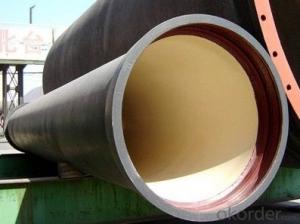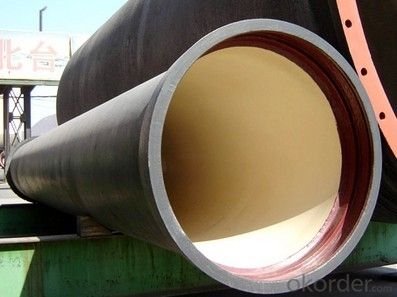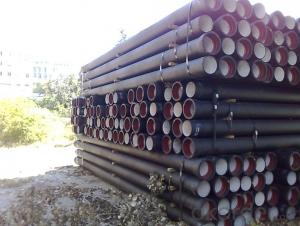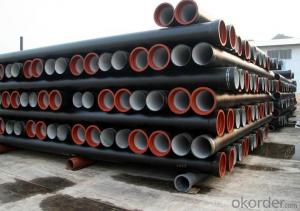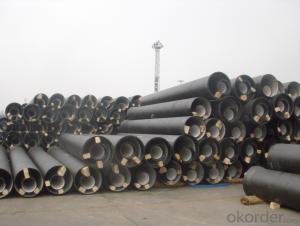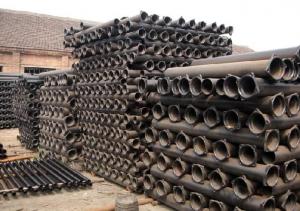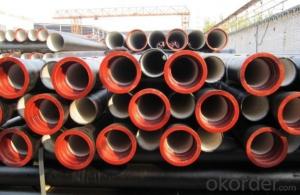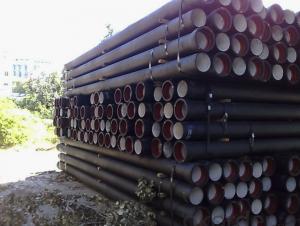Ductile Iron Pipe EN545 DN900 Made in China
- Loading Port:
- China main port
- Payment Terms:
- TT OR LC
- Min Order Qty:
- 999 m
- Supply Capability:
- 9999 m/month
OKorder Service Pledge
OKorder Financial Service
You Might Also Like
1,Ductile Iron Pipe Description :
1) Pipes confirm to ISO2531,K9 class,T type joint,6m long,with inside cements lining conform to ISO4179, outside Zinc spraying(130g/m2) and bitumen coating(70μm) conform to ISO8179.
2) Pipe ends: Spigot and socket ends, with 100% SBR rubber gaskets accoding to ISO4633
3) we can do third party inspection according to customer's request.
4) Our products have been sold to many international market, such as Middle East and South East Asia and Africa.
2,Main Features of the Ductile Iron Pipe:
High yield strength
High tensile Strength
High corrosion resistance
Material: Ductile iron grade 500-7/ 450-10 in accordance with ISO1083
Test: In accordance with ISO 2531 / EN 545 / EN598 and 100% water pressure test
Length: 6m or cut into 5.6m, 5.7m, 5.8m
Rubber: NBR, SBR, EPDM according to ISO4633 / EN681.1
Note: The gaskets, bolts & nuts are supplied respectively as your special requirement
3,Ductile Iron Pipe Images: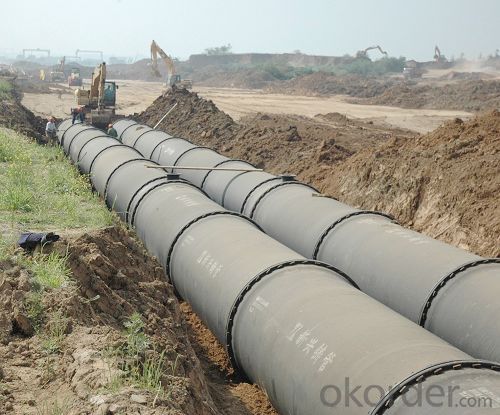
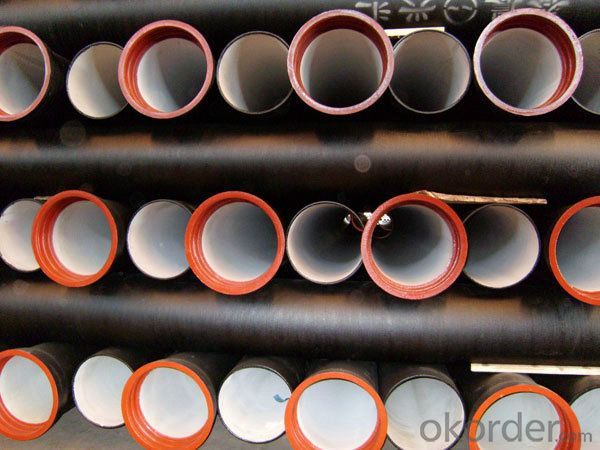
4. Ductile Iron Pipe Specification
Items Details Surface Finishes Bare, Oiled, Mill Varnish, Galv,FBE, FBE Dual, 3LPE, 3LPP, Coal Tar,Concrete Coating and Tape Wrap
End Finishes Beveled, Square Cut, Threaded, hat Additional Services Internal Coating
Packaging packed in bag, plastic bag, steel strip, steel wire,double wire, iron box, wooden box, tarpaulin,
plastic sheeting
Inspection MOODY SGS BV GL DNV ABS LIOYD’Test X-ray, UT, magnetic particle,inspection,
hydrostatic test.
Processing service Beveling, Threading, Slotting, Cut-to length, Bends, Quench and Temper, Fabrication, Double-jointing and On-site assistance
Documentary MTC, material certification,Origin certification, CI or PI, Test Report, export licence, handling order, B/L,insurance policy,shipping instructions, contract, packing list etc.
5.FAQ:
We have organized several common questions for our clients,may help you sincerely:
1.Q: Why would you choose ductile iron pipe rather than other pipe materials?
A:The reasons are obvious for that not only ductile iron pipe possesses the inherent strength and flexibility of ductile iron, combined with proven corrosion protection systems, but also the cost savings can be achieved from design to installation and commissioning.
2.Q:Why can you guarantee the inner of pipes can’t be corroded?
A: High alumina cement mortar lining and sulphate-resistant cement mortar lining. These two special linings are applicable to inner anti-corrosion for sewage pipes, improving resistance to erosion of the sewage components.
- Q: How do ductile iron pipes perform in acidic soil conditions?
- Ductile iron pipes perform well in acidic soil conditions due to their inherent corrosion resistance. The high carbon content and protective coating of ductile iron pipes make them less susceptible to corrosion from acidic substances in the soil, ensuring their durability and longevity.
- Q: Are ductile iron pipes suitable for installation in areas with high seismic activity?
- Yes, ductile iron pipes are suitable for installation in areas with high seismic activity. Ductile iron pipes have excellent strength and flexibility, allowing them to withstand ground movements caused by earthquakes. Their ability to absorb and distribute stress makes them a reliable choice for underground infrastructure in seismic-prone regions.
- Q: Can ductile iron pipe be used for water treatment plant sludge handling?
- Yes, ductile iron pipe can be used for water treatment plant sludge handling. Ductile iron pipe is known for its strength and durability, making it suitable for handling various types of fluids, including sludge. It can withstand the corrosive nature of sludge and is resistant to abrasion, which is important in a sludge handling system. Additionally, ductile iron pipe has a smooth interior surface, which helps to prevent clogs and allows for efficient flow of the sludge. Overall, ductile iron pipe is a reliable choice for water treatment plant sludge handling.
- Q: What are the environmental benefits of using ductile iron pipe?
- There are several environmental benefits associated with using ductile iron pipe in various applications. Firstly, ductile iron is a highly durable material that can withstand harsh environmental conditions and has a long lifespan. This means that ductile iron pipes require less frequent replacements compared to other pipe materials, reducing the need for resource-intensive manufacturing processes and minimizing the disposal of old pipes. Secondly, ductile iron pipes have excellent corrosion resistance properties, which reduces the risk of leaks and pipe failures. This not only prevents potential water contamination but also minimizes the wastage of water resources. Additionally, ductile iron is a recyclable material. At the end of its useful life, ductile iron pipes can be melted down and used to manufacture new products, reducing the demand for virgin materials and conserving natural resources. Furthermore, the manufacturing process of ductile iron pipe has improved significantly over the years, resulting in reduced energy consumption and emissions. Today, many manufacturers use energy-efficient technologies and practices to produce ductile iron pipes, contributing to a lower carbon footprint and reduced air pollution. Lastly, ductile iron pipes have a smooth internal surface that minimizes friction and allows for efficient water flow. This can lead to energy savings in pumping and distribution systems, as less energy is required to transport water through the pipeline network. Overall, using ductile iron pipe can have a positive impact on the environment by reducing waste, conserving resources, minimizing pollution, and improving energy efficiency in water distribution systems.
- Q: How do ductile iron pipes perform in high-altitude areas?
- Ductile iron pipes perform well in high-altitude areas as they are highly resistant to corrosion and can withstand extreme temperature variations. The material's flexibility and strength make it suitable for handling increased pressure caused by altitude changes, ensuring reliable water distribution systems even in mountainous regions.
- Q: What is the relationship between the direction of the spigot and the direction of the flow in the ductile iron pipe?
- Called "ductile" (Ductile Cast Iron Pipes), referred to as ball pipe, ductile iron pipe and ductile iron pipe etc..
- Q: Can ductile iron pipe be used for hydropower systems?
- Yes, ductile iron pipe can be used for hydropower systems. Ductile iron pipes are known for their strength, durability, and high-pressure capabilities, making them suitable for transporting water in hydropower systems. Additionally, ductile iron pipes have excellent corrosion resistance, which is crucial for long-term use in water-based applications.
- Q: Are ductile iron pipes suitable for underground installations?
- Yes, ductile iron pipes are suitable for underground installations. Ductile iron is a highly durable and strong material that can withstand the various pressures and stresses associated with underground environments. It has excellent resistance to corrosion, making it an ideal choice for underground applications where it may be exposed to moisture, soil, and other corrosive elements. Ductile iron pipes also have a high tensile strength, which allows them to withstand external loads and prevent cracking or breakage under ground movement or heavy traffic. Additionally, ductile iron pipes have a longer lifespan compared to other materials, making them a cost-effective option for underground installations. Overall, ductile iron pipes are a reliable and suitable choice for underground applications due to their durability, corrosion resistance, and long-term performance.
- Q: What material is ductile cast iron 235A?
- Pig iron is an alloy of iron and carbon carbon content more than 2%, pig iron carbon content is generally in 2.5%--4%, including C, SI, and Mn, S, P and other elements, is the use of iron ores in blast furnace products. According to the different forms of carbon in pig iron, and can be divided into pig iron, cast iron and steel ball ductile cast iron. Several precipitation of spherical graphite cast iron. The cutting action on the metal substrate than spheroidal graphite flake graphite cast iron, the strength of the matrix organization strength of 70 ~ 90%, the tensile strength is up to 120kgf/mm2, and has good toughness. Ductile iron chemical composition besides iron usually contains: the amount of carbon 3.3.8%, silicon 2.3.0%, manganese, phosphorus, sulfur and no more than 1.5% of the total amount of rare earth, magnesium spheroiditic agent.
- Q: Can ductile iron pipe be used for municipal water supply?
- Yes, ductile iron pipe can be used for municipal water supply. Ductile iron pipe has been widely used in municipal water supply systems for many years due to its durability, strength, and resistance to corrosion. It is well-suited for underground applications as it can withstand high pressure and heavy loads. Additionally, ductile iron pipe has a long lifespan, typically exceeding 100 years, which makes it a cost-effective choice for municipal water supply systems. Overall, ductile iron pipe is a reliable and commonly used material for ensuring the safe and efficient delivery of water to communities.
Send your message to us
Ductile Iron Pipe EN545 DN900 Made in China
- Loading Port:
- China main port
- Payment Terms:
- TT OR LC
- Min Order Qty:
- 999 m
- Supply Capability:
- 9999 m/month
OKorder Service Pledge
OKorder Financial Service
Similar products
Hot products
Hot Searches
Related keywords
